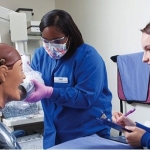What It Takes to Become a LPN
There's little doubt that nursing school is becoming an increasingly popular choice for young students today. With the current economic conditions, the job outlook in many sectors does not appear so good. But that's not true with nurses. The growing number of elderly people means demand for nurses is likely to increase in virtually every area for many years to come.
So now that you've considered going to nursing school, you need to make sure you've met all the requirements. Requirements can vary depending on the type of school and training program you are entering, as well as which part of the country the school is located. Among all the options for becoming a nurse, the one preferred by most is to be a LPN (licensed practical nurse). Assuming you want to enter a LPN program, here are some things to know.
First of all, let's talk about what a LPN does once out in the work force. LPNs are the ones with probably the most direct contact with patients. They work closely and are supervised by RN (registered nurses), and have some contact with doctors as well. Responsibilities include but are not limited to taking patients' vital signs like blood pressure and heart rate, giving out prescribed medications, and keeping up the patient's medical chart. These are important duties that are critical for the medical facility they are in to function smoothly.
To start a licensed practical nurse training program, students need to have a high school diploma and be admitted to the program. Now, how long it takes before you become a nurse is dependent on the education you choose. There are generally two types of LPN programs you can enter. The first is a one year program that is normally offered by a technical or community college. The other is a two year program in which the student obtains an ASN (Associate's in Science of Nursing) degree from a LPN school or university. Both programs are adequate for entry and work as a LPN, but the two year program is obviously a more in depth and likely to open up a few more opportunities once you've graduated.
Whether you choose the one year or two year option, you will need to pass the NCLEX-PN (practical nurse) exam before going to work for a hospital, doctor's office, nursing home, or some other medical facility. This exam can be difficult and some students don't pass it on the first try. This is why when searching for a good LPN program, one of the things you want to pay special attention to is the success rates for graduates when they take this exam. Ideally, graduates from a LPN school should have a NCLEX passing rate of least 90%.
These are the basics for getting into nursing school. Since each person has their own unique circumstances, so depending on what they are, they will need to select the program that's best for them. The next step is doing your due diligence and finding a nursing program that has a reputation for quality and is a good fit for what you are trying to accomplish.
More to Read:
Previous Posts:

